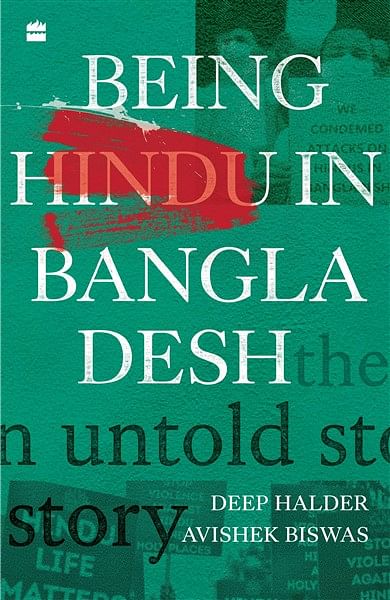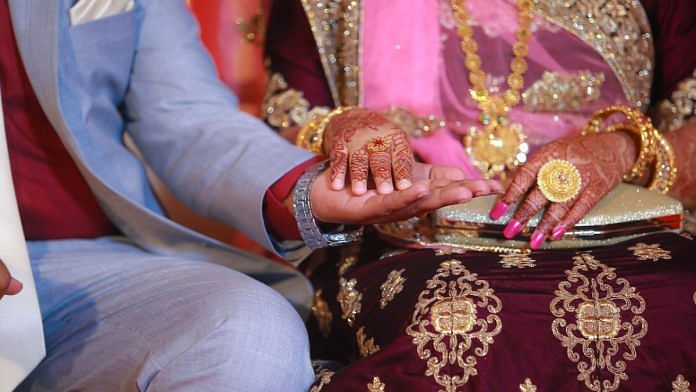We are headed nowhere,’ says Dr Akhil Poddar, Chief News Editor, Ekushey TV. ‘I would not encourage a Hindu boy to fall in love with a Muslim girl in Bangladesh. And I speak from experience.’
It is a busy news day in Dhaka. Bangladesh’s Prime Minister Sheikh Hasina is in Delhi to meet Indian Prime Minister Narendra Modi and Dhaka is debating what the talks would achieve. Inside his cozy cabin, Dr Poddar is multitasking by briefing guests on the primetime debate soon to be telecast live from the studio, and also answering our questions. Dr Poddar is of interest to us not just for his insights into Bangladesh’s society as a crack reporter in his younger days and now as the newsroom head of a prominent TV channel, but also because he happens to be a Hindu man married to a Muslim woman. And unlike Srijit and Mithila, Dr Akhil Poddar and his wife US Ananya, live in Dhaka.
In between briefing his guests and answering our queries, Dr Poddar offers us coffee. We notice an assortment of coffee beans in different jars on his desk. On his bookshelf is a book titled Bongobondhur Shopner Bangladesh (‘Bongobondhu Shiekh Mujibur Rehman’s dreamland Bangladesh’) by Sheikh Fazlul Karim Selim. Dr Poddar sees us looking at the book, smiles and says: ‘That dream is all that remains.’
Given his love for coffee, did love happen over caffeine?
‘When love happened, coffee was an aspirational drink! I was a student of Islamic University in Kushtia and a correspondent for the Jana Kontha newspaper. I used to meet this senior journalist Ali Habib. Ali had a penchant for coffee. I would watch in wonder as he would call the attendant to his cabin and ask for hot water, put the coffee filter in a mug, pour the hot water over the filter until saturated, smell it and then sip the filtered coffee. He would do all of this in front of me, but he would never offer me a cup. I promised myself the day I made something of my life I would only drink coffee!’
Dr Poddar takes a pause to take a big sip from his coffee mug, then continues: ‘Not being offered coffee was the least of my problems though. Before I became a student of Islamic University during 1994–95, no Hindus were allowed to study there. It was the result of the “revolution” of student leaders before me that I got the opportunity to study in that university. I was a rather fiery student leader myself and would listen to songs of the Bauls, the Fakirs and the Pirs and dream of changing the world through revolution. Little did I know revolution would come encased in love! Ananya was my junior at the university. She was popular for her poetry recitals. I had some pull in deciding names for the varsity’s annual fest and quietly slipped her name in. A college senior finally introduced us and our first date was inside the empty teacher’s room! Looking back, I feel had I not been a journalist I would not have been able to carry on with the affair. Friends were supportive but society wasn’t. Ananya told me we couldn’t get married in Kushtia. Her father was once a member of the Communist Party and he had no problem with our union, but her extended family was not too amused. And then there was the question of the larger society. We had to shift to Dhaka.’
Dr Akhil Poddar and U.S. Ananya got married under the Special Marriage Act. No one knew except his mother. Ananya had started working by then. She came out of her office, met Dr Poddar, got the marriage registered and went back to work. It was as uneventful as that. ‘Or as eventful, considering the enormity of the decision we had taken,’ Dr Poddar says. That was in 2007 and they continued to stay in separate flats even though they had gotten married.
In 2008, the couple moved in together. The families had come to know of their marriage by then. Dr Akhil Poddar had begun to climb Dhaka’s media ladder and Kushtia, where their story began, was far away.
How is life today in Dhaka as an interfaith couple with a young son, we ask?
‘We have named our son Agnisnan. It means bathed in fire. He is a student of Class VI. I see him grow and wonder whether he will be able to spend his whole life as a Hindu in Bangladesh. I am the chief news editor of this TV channel and have some agency in the city, but my son complains to my wife that sometimes our driver passes snide comments on his mixed parental background. My wife had to change jobs as she could not take the constant barbs she got for marrying a Hindu man.’
So loving the other in Bangladesh is fraught with difficulties?
‘Interfaith love in today’s Bangladesh is as flawed as the Special Marriage Act under which couples like us have to get married.’
In Bangladesh family laws, including laws concerning marriage, are mostly regulated by the religious laws of the concerned individual. The legal column ‘Your Advocate’ in The Daily Star newspaper explained this to a Muslim man who wanted to marry his Hindu lover:
As your friend is Muslim, Muslim law will regulate his marriage-related issues and Hindu law will apply for the girl belonging to Hinduism. In accordance with Islamic Law, a Muslim male is permitted to marry any girl who is a follower of any Kitaab (scripturalist), e.g. Muslim, Christian, or Jew, but marriage to polytheists and idol or fire worshippers (e.g. Hindus) are not allowed under the Islamic law. As such, if they keep their respective religious beliefs, unfortunately, such marriage is not permitted within the existing legal framework of the country.
Although two adults belonging to two different religions can get married under the Special Marriage Act 1872, they have to declare themselves as non-believer (atheists) before the marriage is solemnized.
When a marriage is solemnized under this Special Marriage Act, the bride and the bridegroom have to sign a Declaration which reads: ‘I do not profess the Christian, Jewish, Hindu, Muslim, Parsi, Buddhist, Sikh or Jaina religion’ or (as the case may be) ‘I profess the Hindu, or the Buddhist, or the Sikh or the Jaina religion’. It is noteworthy that if the female partner declares that she is a Hindu, it will not be possible for her to marry a Muslim male, as the religion Islam is not mentioned in the second part of the Declaration.
The issues, if any, of the Special Marriage Act did not seem to matter much to Apu Biswas because she had bigger worries. A prominent name in the Bangladeshi film industry, Apu Biswas, a Hindu, and superstar Shakib Khan’s romance, secret marriage and the birth of their son Abraham Khan Joy were all shrouded in secrecy. Many of Apu’s big films are with Shakib Khan, but perhaps her most dramatic performance was in Shakib Khan’s absence when she landed up at a television studio with her young son to announce she was married to Shakib Khan and the child is his! Soon after, they made their divorce official on 22 February 2018.
 This excerpt from Being Hindu in Bangladesh: The Untold Story by Deep Halder and Avishek Biswas has been published with permission from HarperCollins India.
This excerpt from Being Hindu in Bangladesh: The Untold Story by Deep Halder and Avishek Biswas has been published with permission from HarperCollins India.



